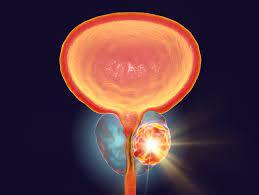Prostate cancer
Prostate cancer
A cancerous tumor that develops in the prostate is known as prostate disease. In men, the prostate is a tiny pecan-shaped organ that produces the primary fluid that supports and transports sperm. One of the most well-known types of malignant development is the prostate disease. Many prostate disorders are localized to the prostate organ and grow slowly, rarely causing noticeable symptoms. However, while some forms of prostate illness progress gradually and may need little to no therapy, other arrangements are aggressive and can spread quickly. The most evident chance for a successful course of treatment is for prostate disease to be discovered early when it is bound to the prostate organ.

Causes
According to medical professionals, prostate cells change in their DNA, which is how prostate cancer starts. The instructions directing a cell’s behavior are encoded in its DNA. The modifications instruct the cells to grow and divide faster than typical cells. While other cells would die, the aberrant cells survive. A tumor is created by the accumulating aberrant cells, which can spread to invade neighboring tissue. Over time, specific aberrant cells may separate and disperse (metastasize) to different bodily regions.
Risk factors
Factors that can increase your risk of prostate cancer include:
Older age: Your gamble of prostate malignant growth increments as you age. It’s considered chiefly normal after age 50.
Race: Because of reasons not set in stone, Individuals of color have a more severe gamble of prostate malignant growth than do individuals of different races. In Individuals of color, prostate disease is bound to be forceful or progressed.
Family history:If a close family member, for example, a parent, kin, or youngster, has been determined to have malignant prostate growth, your gamble might be expanded. Likewise, assuming you have a family background of qualities that increment the stake of bosom malignant growth (BRCA1 or BRCA2) or an imposing family background of bosom disease, your gamble of prostate malignant growth might be higher.
